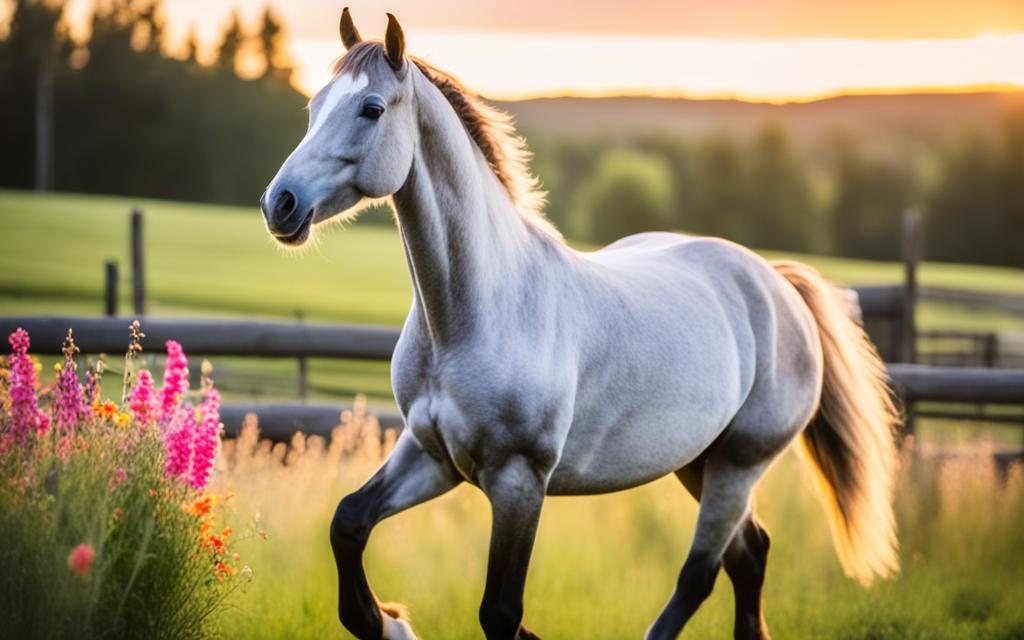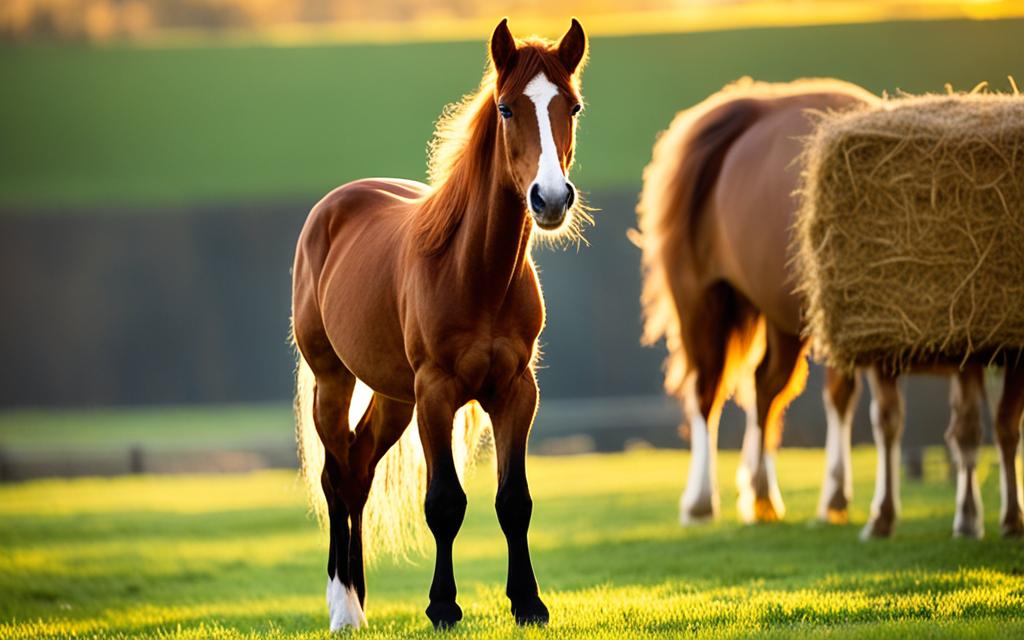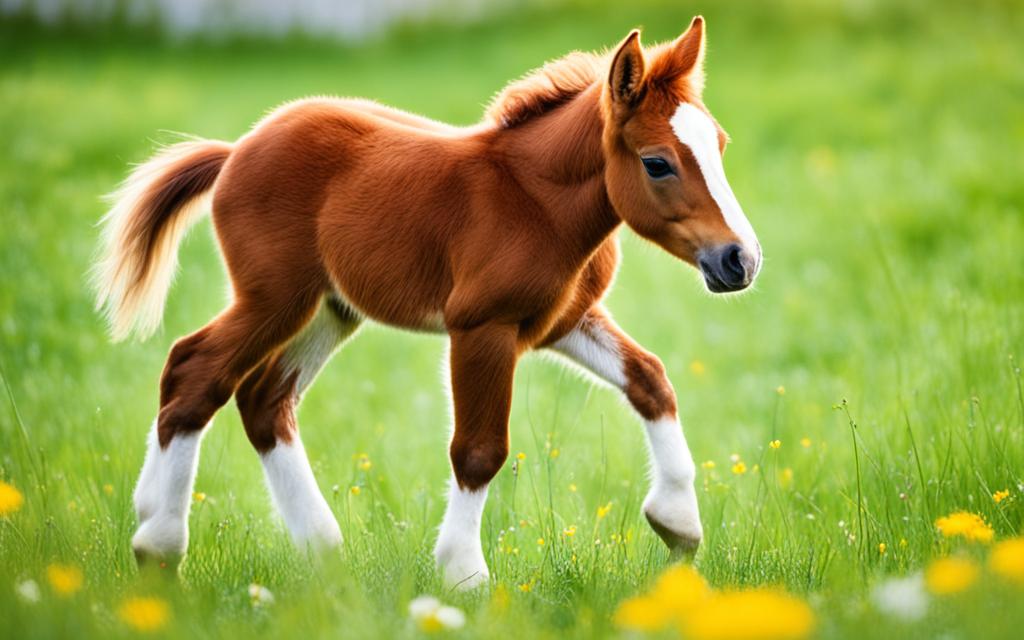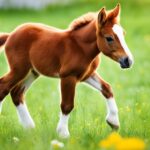Welcome to our informative guide on the world of baby horses! If you’ve ever wondered what a baby horse is called or wanted to learn more about these adorable creatures, you’ve come to the right place. In this section, we will delve into the terminology and distinctions surrounding young horses. Let’s explore the fascinating world of baby horses and discover their unique journey from foal to adult.
Key Takeaways:
- The term for a baby horse is a foal.
- Male foals are called colts, while females are referred to as fillies.
- Baby horses go through various developmental stages as they grow.
- Proper care and early training are essential for the well-being of baby horses.
- Understanding the terminology and behaviors associated with young horses is crucial for horse owners and enthusiasts.
Understanding Foals: Baby Horse
When it comes to young horses, they are commonly referred to as foals. The term “foal” encompasses equine infants from birth until they reach one year of age. Understanding foals and their unique requirements is essential for their proper growth and development.
Foals are adorable creatures with distinct characteristics that differentiate them from adult horses. Let’s explore some key aspects of foals that make them truly fascinating:
- Their size: Foals are smaller in stature compared to their fully-grown counterparts, making them irresistibly cute.
- Physical features: They have soft, fuzzy coats and disproportionately long legs, which they will eventually grow into.
- Baby teeth: Foals have deciduous, or “baby,” teeth that will be replaced with permanent teeth as they age.
- Playfulness: Foals are naturally curious and love to frolic and explore, showcasing their spirited nature.
To give you a visual representation of the adorable foals, take a look at this image:
The Difference Between Colts and Fillies
When it comes to baby horses, there are important distinctions to be made based on their gender. A male foal is referred to as a colt, while a female foal is known as a filly. Understanding these designations is crucial, especially in the field of horse breeding and management.
Colts and fillies have both physical and behavioral differences that differentiate them. Let’s take a closer look at these characteristics:
Colts:
A colt is an uncastrated male horse that is less than four years old. They are known for their strength, vigor, and noble presence. Colts often display more assertive and dominant behaviors compared to fillies, making them well-suited for certain equestrian disciplines and breeding purposes.
Fillies:
On the other hand, a filly is a young female horse that is also less than four years old. Fillies tend to be more gentle and have a milder temperament compared to colts, making them more suitable for certain riding disciplines and equestrian events. They possess grace, elegance, and a nurturing instinct that contributes to their unique appeal.
Here is a visual representation of the key differences between colts and fillies:
| Colts | Fillies | |
|---|---|---|
| Gender | Male | Female |
| Physical Traits | Strong, muscular | Graceful, elegant |
| Behavioral Characteristics | Assertive, dominant | Gentle, nurturing |
| Suitability | Breeding, certain equestrian disciplines | Some riding disciplines, equestrian events |
Understanding the differences between colts and fillies can help horse owners and enthusiasts make informed decisions regarding breeding, training, and specialization. By recognizing the unique qualities and characteristics of each gender, we can better appreciate the diversity and beauty of these magnificent creatures.
Stay tuned for the next section where we will explore the various developmental stages of baby horses as they grow into adulthood.
Developmental Stages of Baby Horses
As baby horses grow into adulthood, they go through various developmental stages that are important to understand. These stages are characterized by different terminologies, each representing a distinct phase of their growth and training. By familiarizing ourselves with these terms, such as weanlings, yearlings, and two-year-olds, we can gain valuable insights into the progression of young horses.
The Developmental Stages:
- Weanlings: Weanlings are baby horses that have recently been separated from their mothers and are transitioning to a diet solely composed of solid food. This stage typically occurs around the age of 6-8 months.
- Yearlings: Yearlings are horses that have reached the age of one year. At this stage, they have gone through significant physical and behavioral changes, becoming more independent and curious about their surroundings.
- Two-Year-Olds: Two-year-olds are young horses that have reached the age of two. They continue to grow and develop, gaining strength and coordination. This stage is a crucial time for training and preparing them for further education and activities.
Understanding these developmental stages allows us to tailor their care, training, and nutrition accordingly. It helps ensure that young horses receive the appropriate support and guidance as they progress towards adulthood.
| Developmental Stage | Description |
|---|---|
| Weanlings | Separated from their mothers and transitioning to solid food |
| Yearlings | Reached the age of one year, displaying increased independence |
| Two-Year-Olds | Reached the age of two, continuing to grow and develop |
Caring for Baby Horses
Ensuring the optimal growth and well-being of baby horses, known as foals, requires special care and attention. Meeting their specific needs in terms of nutrition, socialization, and veterinary care is essential for their healthy development.
Nutrition
Proper nutrition plays a crucial role in supporting the growth and development of foals. A balanced diet that meets their nutritional requirements is essential during their early stages of life. Foals should have access to high-quality forage, such as hay and pasture, as well as a specialized foal feed that provides the necessary vitamins, minerals, and proteins.
Socialization
Socialization is an important aspect of foal development. Foals should have the opportunity to interact with other horses, both young and adult, in a safe and controlled environment. This allows them to develop important social skills and learn appropriate behaviors from their herd mates.
Veterinary Care
Regular veterinary care is vital for baby horses. Foals should receive vaccinations and deworming treatments according to a veterinarian’s schedule. Routine health check-ups should also be conducted to ensure that any potential issues are identified and addressed early on.
| Key Care Aspects for Baby Horses | Summary |
|---|---|
| Nutrition | Provide a balanced diet with high-quality forage and specialized foal feed. |
| Socialization | Allow foals to interact with other horses, developing social skills and appropriate behaviors. |
| Veterinary Care | Schedule regular vaccinations, deworming treatments, and health check-ups. |
By addressing the specific needs of foals through proper nutrition, socialization, and veterinary care, we can ensure that they grow into healthy and well-adjusted adult horses. Taking the time to provide appropriate care during their early stages sets the foundation for their future well-being and success.
Training Young Horses
Training is a crucial part of a young horse’s development, setting the foundation for a successful future in performance or riding disciplines. By introducing basic training concepts to foals, we can help them learn essential skills and behaviors. Let’s explore some of the best practices for training young horses.
Establishing Trust and Bonding
Building a strong bond of trust with your young horse is vital before starting any training. Spend time together, engage in gentle grooming sessions, and establish a positive relationship based on mutual respect. This foundation of trust will greatly enhance the training process and create a harmonious partnership.
Positive Reinforcement
When training young horses, it’s essential to use positive reinforcement techniques. Reward desired behaviors with praise, gentle strokes, or small treats to reinforce their understanding of what is expected. This approach helps them associate training with positive experiences, making them more eager to learn and please.
Gradual Training Progression
To prevent overwhelming your young horse, start with simple exercises and gradually increase the difficulty level as they become more proficient. This progressive approach allows them to build confidence and ensures they can master each step before moving forward. Remember, patience is key during the training process.
Exposure to Different Environments
Expose your young horse to various environments, both at home and away. This exposure helps them become more adaptable and confident in new surroundings, which is crucial for their future performance. Introduce them to different arenas, trails, and group settings to broaden their experiences and prepare them for diverse situations.
Consistency and Routine
Consistency is key when training young horses. Establish a regular training routine and stick to it, as this consistency helps them understand expectations and develop good habits. Regularly reinforce their training outside of formal sessions by incorporating consistent handling and reinforcing positive behaviors during daily care.
Professional Guidance
Seeking professional guidance from experienced trainers can greatly benefit both you and your young horse. Trainers have the expertise to guide you through the training process, ensuring you use proper techniques and effectively address any challenges that may arise. Their guidance can help set you and your horse up for success.
Remember, every young horse is unique, and the training process may vary based on their individual personality and development. Patience, positive reinforcement, and clear communication are essential elements to foster a strong partnership and prepare your young horse for a bright future.
| Benefit | Training Approach |
|---|---|
| Building trust | Establishing a bond through care and grooming sessions |
| Encouraging motivation | Using positive reinforcement techniques such as praise and treats |
| Ensuring progress | Gradually increasing difficulty levels in training exercises |
| Promoting adaptability | Exposing young horses to different environments |
| Establishing consistency | Following a regular training routine and reinforcing behaviors |
| Seeking professional guidance | Consulting experienced trainers for expert advice |
Common Challenges in Raising Baby Horses
Raising foals can be a rewarding experience, but it also comes with its fair share of challenges. As horse owners, it’s essential to be aware of these common challenges and equip ourselves with the knowledge and skills necessary to overcome them. From managing their health to addressing their energetic nature, let’s explore some of the most prevalent hurdles faced when caring for young horses.
1. Health Issues
Like any young animals, baby horses are susceptible to various health issues. From respiratory infections to gastrointestinal problems, it’s crucial to monitor their well-being closely. Regular veterinary check-ups, proper nutrition, and a clean environment are essential in minimizing the risk of health complications.
2. Energy Management
Baby horses are known for their high energy levels, which can sometimes pose a challenge to their handlers. Their playfulness and curiosity can lead to unpredictable behaviors, potentially putting themselves and others at risk. Effective energy management techniques, such as providing ample turnout time, structured exercise routines, and engaging mental stimulation, are crucial in channeling their energy appropriately.
3. Training and Discipline
Teaching young horses essential skills and behaviors is a vital part of their development. However, training foals can be challenging due to their short attention spans and limited understanding of commands. Patience, consistency, and positive reinforcement are key to effective training and discipline.
4. Socialization
Young horses thrive on social interaction and benefit greatly from exposure to various environments and situations. Proper socialization helps them develop confidence, adaptability, and good manners. However, it’s important to introduce them to new experiences gradually and ensure their safety throughout the socialization process.
5. Weaning
Weaning is the process of transitioning a foal from its mother’s milk to solid food. This can be a challenging time for both the foal and the owner. It requires careful planning and management to ensure a smooth transition while minimizing stress for the young horse.
6. Financial Considerations
Raising foals can be a costly endeavor. From veterinary care and nutrition to training and equipment, it’s essential to budget and plan for these expenses. Understanding the financial commitments involved in caring for baby horses is crucial for their overall well-being.
It’s important to approach these challenges with patience, love, and a willingness to learn. Every foal is unique, and understanding their individual needs and personalities is key to overcoming these obstacles. Remember, the bond formed during the early stages of a horse’s life will lay the foundation for a strong and long-lasting partnership.
By being aware of these common challenges and implementing effective strategies, we can ensure the healthy growth and development of our young horses. Let’s provide them with the care, attention, and guidance they need to thrive into magnificent adult horses.
Famous Baby Horses in History
Throughout history, certain young horses have gained fame and recognition in the equine world. These exceptional foals captivated the hearts of people and left a lasting impact on the equestrian community. Let’s explore some notable examples of these famous baby horses and their remarkable contributions.
The Black Stallion
The Black Stallion, a fictional character created by author Walter Farley, is renowned for his spirit, strength, and untamed beauty. This iconic equine infant has inspired generations of young readers and horse enthusiasts through the beloved book series and subsequent film adaptations. The Black Stallion’s journey from a wild Arabian colt to a legendary racehorse is a testament to the power of determination and the enduring bond between humans and horses.
Secretariat

“Secretariat is moving like a tremendous machine!” – Track announcer Chic Anderson
Secretariat, often hailed as the greatest racehorse of all time, stole the spotlight with his extraordinary talent and indomitable spirit. As a young foal, Secretariat showcased his greatness early on and went on to achieve legendary status as he dominated the racing world. His record-breaking victories, including the iconic Triple Crown win in 1973, forever etched his name in the annals of horse racing history.
Smarty Jones
Smarty Jones emerged as an underdog with a heartwarming journey that captured the hearts of millions. This spirited young colt overcame adversity to become one of the most beloved racehorses of the early 2000s. Smarty Jones captured the public’s imagination with his thrilling performances and nearly secured the elusive Triple Crown title in 2004. Despite falling short in the Belmont Stakes, his indomitable spirit and tremendous achievements solidify his place among the most famous baby horses in history.
| Horse | Notable Achievements |
|---|---|
| The Black Stallion | Inspired generations of horse enthusiasts through book series and films |
| Secretariat | Legendary racehorse, Triple Crown winner, record-breaking performances |
| Smarty Jones | Beloved underdog, thrilling performances, narrowly missed Triple Crown win |
These famous baby horses serve as a reminder of the remarkable journeys that young horses can embark upon. Their stories continue to inspire and ignite a passion for these majestic creatures, ensuring their enduring legacy in the world of horses.
The Importance of Early Interaction and Training
Early interaction and training are vital for the development of young horses, known as foals. By starting their education early, horse owners can establish a strong foundation for their future endeavors, ensuring their growth and well-being.
When baby horses are exposed to positive experiences and human interaction from an early age, they develop essential social and communication skills. This early interaction helps them become comfortable with human presence, handling, and training techniques. It also builds trust and a bond between the foal and the caretaker.
“Early training is key to raising well-rounded and well-behaved young horses. It sets the tone for their future behavior and performance.”
Introducing basic training concepts to foals from the beginning helps them become familiar with cues, commands, and desired behaviors. This early exposure lays the groundwork for more advanced training as they grow older. It also allows the foals to develop coordination, balance, and mental focus, contributing to their overall development.
The Benefits of Early Interaction and Training:
- Establishes a strong bond between foal and caretaker
- Promotes socialization and positive behavior
- Develops trust and confidence in human presence
- Builds a foundation for advanced training
- Aids in foal’s coordination, balance, and mental focus
Keep in mind that early interaction and training should be approached with care and in a gentle manner to ensure the well-being of the foal. Experts recommend engaging in activities such as halter training, leading exercises, and positive reinforcement techniques to foster a positive learning experience for the young horse.
| Training Tips | Benefits |
|---|---|
| 1. Start with short, frequent training sessions | – Builds foal’s attention span and focus – Prevents boredom or overwhelm |
| 2. Use positive reinforcement techniques | – Reinforces desired behaviors – Builds trust and confidence |
| 3. Be patient and consistent | – Establishes clear expectations – Promotes mutual understanding |
| 4. Gradually introduce new challenges | – Encourages foal’s adaptability and problem-solving skills |
| 5. Seek professional guidance if needed | – Ensures correct techniques and approaches – Addresses specific training requirements |
Starting early and investing time in the interaction and training of baby horses can have long-term benefits. It not only lays the foundation for their future development but also contributes to their overall well-being, behavior, and performance as mature horses.
The Transition to Adulthood: Becoming a Horse
As foals mature, they eventually transition into adulthood. This is an exciting time in their development, as they undergo physical, mental, and behavioral changes that shape them into fully grown horses. During this stage, various terms are used to describe young horses as they grow older, indicating their increasing age and maturity.
Growing Pains and Physical Changes
Just like human teenagers, young horses experience growth spurts and physical changes as they transition into adulthood. Their bodies undergo significant transformations, including an increase in height, weight, and muscle development. This period of growth can sometimes be accompanied by temporary awkwardness or clumsiness as their bodies adjust to these changes.
Foals, once small and delicate, gradually grow into young horses with strong and powerful frames. Their limbs lengthen, their bodies fill out, and their features become more refined. It’s truly a remarkable transformation to witness!

Maturing Mentally and Emotionally
As young horses transition into adulthood, they also experience significant mental and emotional growth. They begin to develop a more mature mindset, gaining independence and becoming more confident in their abilities. This is a crucial period for their socialization and learning, as they navigate interactions within their herd and establish their place within the hierarchy.
Horses are highly intelligent and perceptive animals, and their mental growth is just as important as their physical development. As they mature, they become more focused and attentive, demonstrating an increased capacity for learning and problem-solving.
Terminology for Young Horses
Throughout this transitional period, there are various terms used to describe young horses at different stages of their development. These terms provide insights into their age and status within the equine world. Here are some common terminologies:
| Term | Age Range |
|---|---|
| Foal | From birth until one year old |
| Weanling | From the time they are weaned off their mother’s milk until one year old |
| Yearling | From the age of one to two years old |
| 2-Year-Old | In their second year of life, from two to three years old |
These terms help horse enthusiasts and professionals communicate more precisely when discussing young horses. They reflect the different stages of growth and development that young horses go through on their journey to becoming fully grown, mature equines.
Just as butterflies transition from caterpillars, so too do foals transform into magnificent adult horses. Witnessing their growth and development is a privilege that illustrates the beauty and wonder of nature’s handiwork.
As young horses continue to progress through their transitional period, it’s essential to provide them with proper care, guidance, and training. This will help ensure their smooth and successful transition into adulthood, setting them up for a fulfilling and productive life as a horse.
Conclusion
In conclusion, understanding what a baby horse is called is essential in appreciating their remarkable journey from foal to adult. By familiarizing ourselves with the terminologies and behaviors associated with young horses, we can provide better care and nurture these magnificent creatures.
From the moment a foal is born, their growth and development captivate both horse enthusiasts and professionals alike. Learning that a baby horse is called a foal is just the beginning of unraveling the intricacies of their early stages.
Whether it’s caring for their unique needs, training them for future endeavors, or overcoming challenges along the way, the bond formed with a baby horse is truly special. By investing time, effort, and understanding, we can witness their transformation from a vulnerable young horse to a majestic adult, ready to take on the world.
FAQ
What is a baby horse called?
A baby horse is called a foal.
What are some other names for a baby horse?
Some other terms used to refer to a baby horse include equine infant and young horse.
What is a male foal called?
A male foal is called a colt.
What is a female foal called?
A female foal is called a filly.
What are the different stages of development for baby horses?
Baby horses go through various developmental stages, including being called weanlings, yearlings, and two-year-olds.
How should I take care of a baby horse?
Caring for a baby horse involves providing proper nutrition, socialization, and regular veterinary care.
When should I start training a young horse?
It is important to start introducing basic training concepts to foals early on to establish a strong foundation for their future endeavors.
What are some common challenges in raising baby horses?
Raising foals can come with challenges such as health issues and managing their energy levels.
Are there any famous baby horses in history?
Yes, there have been notable baby horses in history that have gained fame and recognition.
Why is early interaction and training important for baby horses?
Early interaction and training play a crucial role in the development of baby horses, helping to establish a strong foundation for their future growth and endeavors.
What happens when a baby horse becomes an adult?
As foals mature, they eventually transition into adulthood, and different terms are used to describe them at various stages of growth.








